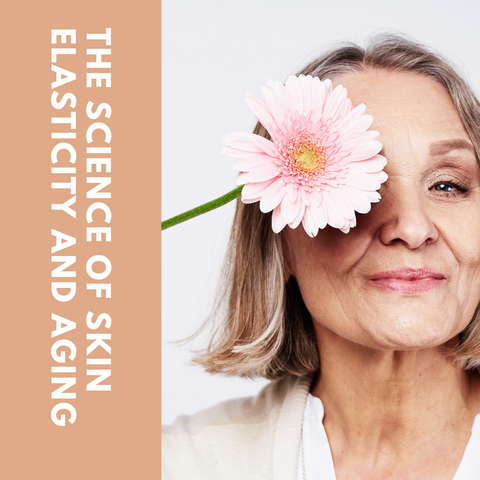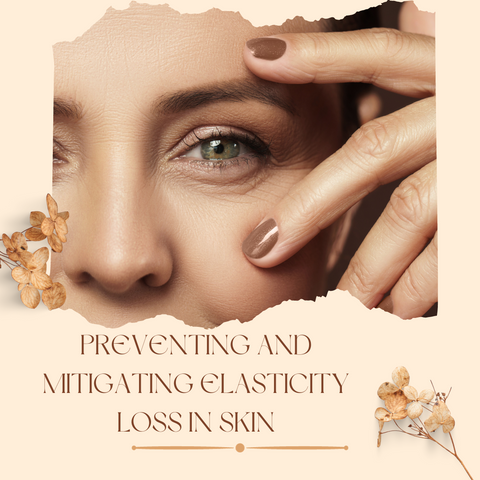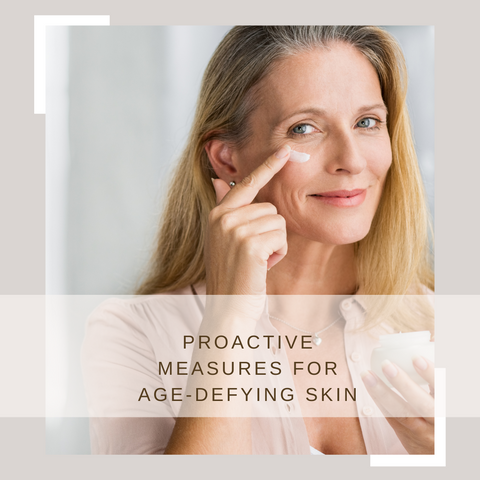Skin elasticity can begin to deteriorate progressively between the ages of 25 and 30. However, significant changes in skin elasticity are more common in the late 30s and early 40s. Genetics, UV exposure, lifestyle choices (such as smoking or nutrition), skincare routine, and overall health can all influence how quickly skin loses elasticity. This decrease in collagen and elastin production can result in fine lines, wrinkles, and sagging skin. Environmental variables and personal habits might hasten this process, causing the skin to lose suppleness sooner than expected. Taking care of the skin through proper skincare, sun protection, a healthy lifestyle, and using skincare products that boost collagen formation can therefore help retain skin suppleness for a longer period of time.
The Science of Skin Elasticity and Aging

The flexibility of the skin is heavily regulated by two key proteins: collagen and elastin. These proteins are in charge of giving the skin structural support, strength, and suppleness. Various scientific advances and investigations are being conducted to better understand and combat the effects of ageing on skin elasticity. Researchers investigate ways to stimulate collagen and elastin production, create skincare products containing ingredients that promote skin elasticity (such as retinoids, peptides, and antioxidants), and investigate novel treatments such as laser therapy, microneedling, and radiofrequency devices to improve skin firmness and elasticity. Maintaining a healthy lifestyle, shielding the skin from UV radiation, following a correct skincare routine, and including items that encourage collagen formation can all help to slow down skin elasticity loss and create a more youthful appearance. A dermatologist or skincare specialist can also provide personalised advice for preserving skin health and suppleness.
Collagen and Elastin: Pillars of Skin Firmness
Collagen and elastin are the primary pillars that greatly contribute to skin firmness, strength, and elasticity.
-
Collagen: This protein is the most abundant in the human body and serves as an important structural component of the skin. Collagen gives the skin strength and stiffness, allowing it to keep its form and structure. It generates a network of fibres that provide strength and resistance to the skin. As we age, our collagen production declines, resulting in fine lines, wrinkles, and sagging skin.
-
Elastin: Elastin, another important protein in the skin, is responsible for its elasticity and ability to snap back into place after being stretched or moved. Elastin allows the skin to retain its shape and flexibility. It works in tandem with collagen to provide the skin with its suppleness and resilience. With age, the production of elastin also diminishes, resulting in reduced skin elasticity and the formation of wrinkles.
Both collagen and elastin play important roles in preserving skin health and young appearance. When these proteins breakdown or synthesis decreases, the skin loses firmness, becomes less elastic, and shows noticeable indications of ageing. Promoting collagen and elastin production through various techniques, such as skincare products containing retinoids, peptides, or vitamin C, or undergoing treatments like microneedling or laser therapy, can help support skin health and improve firmness and elasticity.
How Aging Affects Skin Elasticity
Ageing has a significant impact on skin elasticity due to a variety of biological changes that occur within the skin over time. Reduced collagen and elastin production, decreased skin cell turnover, loss of moisture and hydration, environmental variables, accumulation of advanced glycation end products (ages), and changes in hormone levels are some of the most major ways that ageing affects skin elasticity. These aging-related processes result in skin that is less elastic, more prone to drooping, and more vulnerable to wrinkles and fine lines. While ageing is a natural process, some lifestyle choices, skincare practises, and treatments can help reduce skin elasticity loss and create a more youthful appearance. Maintaining a healthy lifestyle, using sunscreen to protect the skin from sun damage, following a consistent skincare routine with products that support collagen production, eating a balanced diet rich in antioxidants and nutrients, staying hydrated, and avoiding harmful habits like smoking can all help to preserve skin elasticity to the greatest extent possible. There are other cosmetic surgeries and treatments available to increase skin elasticity and firmness. A dermatologist or skincare specialist can provide customised advice based on your specific skin needs.
Genetic and Environmental Influences on Skin Aging
Skin ageing is regulated by both inherited and environmental variables, and the interaction of these elements influences how our skin ages dramatically over time.
-
Genetic Factors: Genetics influence the natural ageing process of the skin. Certain genetic variations can have an effect on the production of collagen, elastin, and other proteins that maintain skin structure and elasticity. Individuals may be predisposed to certain skin conditions, such as the early development of fine lines, wrinkles, or skin sagging. Genetic predispositions influence skin type (e.g., oily, dry, combination) as well as skin thickness, color, and susceptibility to environmental damage.
-
Environmental Factors: One of the key environmental variables that causes skin ageing is exposure to ultraviolet (UV) light from the sun. UV rays can cause collagen and elastin fibres to break down, resulting in premature ageing, wrinkles, sunspots, and skin elasticity loss. Tobacco use, excessive alcohol intake, poor nutrition, a lack of exercise, and insufficient skincare routines can all contribute to faster skin ageing. Smoking, in particular, can reduce collagen formation and reduce blood supply to the skin, resulting in premature wrinkles and sagging. Environmental pollutants and toxins can damage the skin, contributing to oxidative stress and premature aging. Chronic stress can affect the skin by promoting inflammation, which may accelerate skin aging processes.
-
Hormonal Changes: Hormone fluctuations, particularly during menopause in women, can affect collagen formation and skin elasticity, resulting in changes in skin texture and firmness.
While genetics determine how our skin will age, environmental factors can have a substantial impact on the rate and severity of skin ageing. Regardless of genetic predisposition, adopting healthy lifestyle practises and preventative measures can help reduce the impact of environmental influences on the skin.
Preventing and Mitigating Elasticity Loss in Skin

Maintaining skin elasticity is critical for maintaining a youthful appearance, and while some aspects of ageing are unavoidable, there are several strategies to help prevent and mitigate skin elasticity loss:
-
UV Radiation Protection: Wear sunscreen daily, seek shade, and wear protective clothing to protect your skin from harmful UV rays. UV exposure hastens the breakdown of collagen and elastin, resulting in premature ageing and decreased skin elasticity.
-
Good Nutrition and Hydration: Eat a well-balanced diet high in essential fatty acids, vitamins (particularly C), and antioxidants. These nutrients help to prevent oxidative stress and promote the production of collagen. Hydration is also important for skin elasticity, so stay hydrated and plump by drinking plenty of water.
-
Skincare Routine: Use retinoids, peptides, hyaluronic acid, and antioxidants in your skincare products. Peptides promote elastin synthesis while retinoids stimulate collagen production. Hyaluronic acid keeps skin hydrated, and antioxidants fight free radicals that damage skin cells.
-
Avoid Smoking and Drink Moderately: Smoking hastens skin ageing by decreasing collagen production and restricting blood flow. Excessive alcohol consumption dehydrates the skin, causing elasticity loss and premature ageing.
-
Regular Exercise: Exercise increases blood circulation, which delivers oxygen and nutrients to the skin, promoting collagen production and improving skin health.
-
Stress Management and Adequate Sleep: Adequate sleep is essential for skin repair and regeneration. Chronic stress can hasten ageing, so use stress-reduction techniques like meditation, yoga, or mindfulness to help manage stress levels.
-
Gentle Skincare Practises: Be gentle with your skin. Avoid using harsh cleansers and exfoliants, which can harm the skin's barrier. Use a gentle cleanser and moisturiser that is appropriate for your skin type.
-
Professional Treatments: Consider professional treatments such as chemical peels, microdermabrasion, laser therapy, or microneedling, which can stimulate collagen production and improve skin elasticity. Consult a dermatologist or skincare professional to explore these options.
-
Supplements and Topical Treatments: Some supplements, such as collagen peptides or specific vitamins, may help support skin health (under medical supervision). Topical treatments containing growth factors or specific peptides may also aid in the improvement of skin elasticity.
Effective Anti-Aging Skincare Practices
A mix of practises aimed at maintaining skin health, preventing premature ageing, and minimising outward symptoms of ageing constitutes effective anti-aging skincare. Daily sun protection, constant washing, and moisturising, usage of retinoids, antioxidant-rich products, hydration, mild exfoliation, eye cream, good living habits, customised skincare routine, and professional treatments are all excellent anti-aging skincare practises. Results may take some time to appear, so be patient and stick to your routine. Seasonal changes, hormone shifts, and other variables impacting your skin may necessitate adjustments. A skincare specialist can provide specialised guidance and recommendations for anti-aging skincare practises.
Nutrition and Hydration's Role in Maintaining Elasticity
Nutrition and hydration are important for preserving skin suppleness and general skin health. Here is how they help:
-
Collagen Production Support: Certain nutrients are required for the manufacture of collagen, which is required for skin suppleness. Vitamin C, amino acids (such as proline and glycine), and copper are examples. Vitamin C-rich foods (such as citrus fruits, berries, and bell peppers) promote collagen development, while amino acids and copper are essential components of collagen synthesis.
-
Antioxidants for Skin Protection: Antioxidants, which can be found in a variety of fruits, vegetables, nuts, and seeds, help to protect the skin from free radical oxidative stress. Oxidative stress can cause collagen and elastin fibres to break down, resulting in less supple skin and faster ageing.
-
Healthy Fats: Essential fatty acids, particularly omega-3 and omega-6 fatty acids found in fatty fish, flaxseeds, and walnuts, help to maintain the skin's lipid barrier. This barrier helps retain moisture, improving skin hydration and suppleness.
-
Hydration for Skin Plumpness: Proper hydration is essential for skin health. Drinking enough water keeps the skin hydrated, plump, and improves its elasticity. While water intake is important, moisture also comes from fruits, vegetables, and other hydrating foods.
-
Silica-Rich Foods: Silica, found in cucumbers, bell peppers, and whole grains, aids in the formation of collagen, which supports skin elasticity and strength.
-
Protein-Rich Foods: Protein is required for tissue repair and the production of collagen and elastin in the body. Include lean protein sources in your diet, such as poultry, fish, legumes, and tofu.
-
Avoid Excessive Sugar and Processed Foods: Excess sugar consumption can result in the formation of AGEs (advanced glycation end-products), which can damage collagen and elastin fibres and affect skin elasticity. Processed foods high in unhealthy fats may also contribute to skin inflammation and accelerated aging.
A well-balanced diet rich in nutrient-dense meals, combined with proper hydration, helps promote skin elasticity and general skin health. While diet is important, it's also important to note that skincare practises, sun protection, lifestyle choices, and genetics all have an impact on skin elasticity and ageing. A certified dietitian or a healthcare expert can assist in developing a personalised nutrition plan to enhance skin health and elasticity based on individual needs.
Lifestyle Changes to Preserve Skin Firmness
Maintaining skin firmness entails making lifestyle modifications that promote overall skin health. Sun protection, a good diet, hydration, regular exercise, avoiding smoking and limiting alcohol, proper sleep, gentle skincare practises, limiting sugar and processed foods, and expert skincare treatments are some of the lifestyle changes that can help maintain skin firmness. You may help keep skin firmness, promote skin health, and slow the visible indications of ageing by implementing these lifestyle adjustments into your everyday routine. Healthy behaviours, combined with a well-rounded skincare routine, can help to preserve firmer, more youthful-looking skin over time.
Proactive Measures for Age-Defying Skin

Adopting proactive steps that support skin health and combat apparent indications of ageing is vital for maintaining age-defying skin. Sun protection, a good diet, hydration, a skincare routine, regular exercise, proper sleep, stress management, avoiding dangerous habits, gentle skincare practises, regular skin checks, and expert skincare treatments are all proactive measures for age-defying skin. While these preventative actions can help delay the apparent signs of ageing and keep skin looking young, individual outcomes may vary. A skincare specialist or dermatologist can provide personalised advice based on your skin's specific needs and concerns.
Innovative Skin Firming Treatments and Technologies
Skin firming treatments and technologies are constantly evolving to address a variety of skin issues, including enhancing skin firmness and elasticity. Here are some of the most recent developments:
-
Radiofrequency (RF) Therapy: Using radiofrequency energy, RF treatments heat the skin's deeper layers, promoting the production of collagen and elastin. This non-invasive method enhances the overall texture of the skin and encourages skin tightening.
-
Ultherapy (microfocused ultrasound): Ultherapy targets particular layers of the skin to induce the production of collagen by penetrating the skin deeply using focused ultrasound energy. In particular, it helps tighten and lift the skin on the chest, neck, and face.
-
Fractional Laser Technology: By inflicting microscopic injuries on the skin, fractional laser treatments stimulate the production of collagen and the body's natural healing response. These lasers focus on specific areas of the skin, improving tone, texture, and firmness while minimising downtime.
-
Microneedling with Radiofrequency (RF Microneedling): This combines microneedling (a technique that creates tiny punctures in the skin to stimulate collagen) with radiofrequency energy to improve skin tightening and rejuvenation even further.
-
High-Intensity Focused Electromagnetic (HIFEM) Technology: HIFEM treatments, such as EMSCULPT®, use focused electromagnetic energy to induce muscle contractions, which can help strengthen and tone muscles in areas such as the abdomen, buttocks, and thighs, contributing to skin firmness indirectly.
-
Platelet-Rich Plasma (PRP) Therapy: PRP therapy entails drawing a small amount of blood from the patient, processing it to concentrate the platelets, and then injecting it into the skin. PRP contains growth factors that can stimulate collagen production while also improving skin texture and elasticity.
-
Topical and injectable agents: Innovative topical products containing growth factors, peptides, stem cells, and other advanced ingredients can help support collagen production and improve skin firmness. Injectable fillers and volumizers can help sagging skin by restoring volume and providing structural support.
-
Non-Invasive Skin Tightening Devices: These are handheld devices that use different technologies such as ultrasound, radiofrequency, or infrared light to help tighten and firm the skin.
When contemplating these revolutionary treatments, it's critical to contact a trained dermatologist or skincare specialist to decide the best solution for your skin type, issues, and treatment goals. Individuals may react differently to various therapies, thus a personalised approach is required to attain the best results while evaluating potential dangers and benefits.
Natural Remedies to Boost Skin Elasticity
Several natural therapies and components can aid in the improvement of skin elasticity and general skin health. While they may not give instant or dramatic results, regular use can help to improve skin elasticity over time. Consider the following natural remedies:
-
Aloe Vera: Aloe vera gel, known for its soothing and hydrating properties, can help improve skin elasticity. It contains vitamins, minerals, and antioxidants that aid in the production of collagen and the healing of the skin.
-
Coconut Oil: Packed with antioxidants and fatty acids, coconut oil nourishes and hydrates skin. The elasticity of the skin can be enhanced, and a smoother appearance can be promoted by topically applying coconut oil.
-
Almond Oil: Rich in fatty acids and vitamin E, almond oil is an emollient and moisturising substance that can improve the firmness and elasticity of the skin.
-
Rosehip Seed Oil: This oil is high in vitamins A, C, and E, as well as vital fatty acids. It promotes skin regeneration, texture improvement, and collagen formation, resulting in increased skin suppleness.
-
Jojoba Oil: Jojoba oil is a good moisturiser since it closely resembles the skin's natural sebum. Regular application can help keep skin hydrated and elastic.
-
Shea Butter: Shea butter, which is high in fatty acids and vitamins, is highly moisturising and can enhance skin suppleness by giving intensive hydration and nourishment.
-
Green Tea Extract: Green tea extract, which is high in antioxidants, can protect the skin from oxidative stress, boost collagen formation, and contribute to increased skin suppleness.
-
Vitamin C-Rich Foods: Include vitamin C-rich foods in your diet, such as citrus fruits, strawberries, bell peppers, and leafy greens. Vitamin C promotes collagen formation, which is necessary for skin suppleness.
-
Healthy Hydration: Drinking plenty of water helps keep skin hydrated, which contributes to improved skin elasticity and overall health.
-
Facial Massage: Gentle facial massages on a regular basis can assist increase blood circulation, lymphatic drainage, and possibly skin firmness.
While these natural therapies may be useful to skin health, keep in mind that individual outcomes may vary. When employing natural medicines, consistency and patience are essential. Additionally, before using any new substance, always perform a patch test to ensure there are no bad reactions or allergies. Consultation with a dermatologist or skincare specialist is recommended if you have ongoing skin concerns or want to see major improvements.
The Importance of Sun Protection in Preventing Elasticity Loss
Sun protection plays a crucial role in preventing elasticity loss and maintaining skin health. Here's why it's so important:
-
UV Radiation and Collagen Breakdown: One of the key causes of skin ageing is prolonged exposure to ultraviolet (UV) light from the sun. UV rays penetrate the skin, causing collagen and elastin fibres to break down. Collagen offers structural stability, whereas elastin provides suppleness to the skin. UV radiation causes these important proteins to degrade, resulting in decreased skin firmness and suppleness.
-
Wrinkles and Sagging Skin: UV radiation causes wrinkles, fine lines, and sagging skin by breaking down collagen and elastin. This damage accumulates over time, causing the skin to lose its ability to bounce back, resulting in reduced elasticity.
-
Sunspots and Uneven Skin Texture: UV radiation from the sun can also cause the formation of sunspots, hyperpigmentation, and uneven skin tone. These disorders can have an impact on the overall appearance of the skin and contribute to premature ageing.
-
Risk of Skin Cancer: Sun exposure without protection raises the chance of acquiring skin cancers such as melanoma, basal cell carcinoma, and squamous cell carcinoma.
Sun protection techniques such as applying sunscreen with a high SPF, seeking shade, wearing protective gear (such as hats and sunglasses), and avoiding peak sun hours can help reduce UV-induced skin damage. Sunscreen serves as a shield against UV radiation, keeping it from reaching the skin and damaging collagen and elastin fibres. Broad-spectrum sunscreens safeguard the skin from the harmful effects of both UVA and UVB rays. It is essential to wear sunscreen on a regular basis, regardless of the weather or season, to maintain skin health and elasticity. To guarantee ongoing protection, reapply sunscreen every two hours, especially if you're sweating or swimming. You may dramatically reduce the risk of elasticity loss, premature ageing, and other sun-related skin issues by including sun protection in your daily skincare routine. Finally, shielding your skin from the sun's harmful UV rays is an important technique for supporting general skin health and keeping skin suppleness.
Beyond the Surface: Holistic Approaches to Skin Elasticity

Holistic methods for skin elasticity take into account aspects other than topical therapies, such as overall health and lifestyle habits that influence skin health. Nutrition, hydration, stress management, quality sleep, regular exercise, sun protection, avoiding dangerous behaviors, skincare regimen, mind-body connection, holistic therapies, and environmental factors are all holistic techniques to support skin elasticity. By using these holistic tactics, you can create an atmosphere that is conducive to maintaining skin elasticity and general skin health. Adopting a holistic lifestyle that cares for not only your skin but also your whole well-being helps you achieve healthy, robust, and elastic skin.
Integrating Wellness and Skincare for Elasticity
Integrating wellness practises into your skincare routine can improve skin elasticity and general skin health dramatically. Nutrition, hydration, stress reduction, quality sleep, regular exercise, sun protection, mindfulness in skincare, holistic therapies, good habits, and self-care practises are some ways to integrate wellness and skincare for increased elasticity. By incorporating these wellness practises into your skincare routine, you can achieve a more comprehensive approach to skin health and elasticity. Balancing internal health with external healthcare measures helps to keep skin healthy, supple, and beautiful.
The Future of Anti-Aging Skin Care
The field of anti-aging skincare is evolving due to advancements in technology, research, and innovative ingredients. Advanced ingredients, personalised skincare, bioengineering and regenerative medicine, non-invasive treatments, nutricosmetics, sustainability and clean beauty, wearable technology innovations, and collaboration with wellness and lifestyle factors are some potential directions and aspects that could shape the future of anti-aging skincare. As scientific research and technology progress, the future of anti-aging skincare will most likely offer more innovative and tailored solutions aimed at promoting healthier, more youthful-looking skin. However, specific breakthroughs and advancements may have occurred since my last update, and staying up to date on the latest developments in the field is critical for a comprehensive understanding of future anti-aging skincare trends.
Expert Insights on Skin Elasticity and Aging
Expert opinions continuously emphasise the need of a diversified strategy to maintaining skin elasticity. UV protection, a healthy lifestyle, effective skincare products, and consideration of modern research and technologies all contribute to youthful, supple, and healthy skin as we age.
















